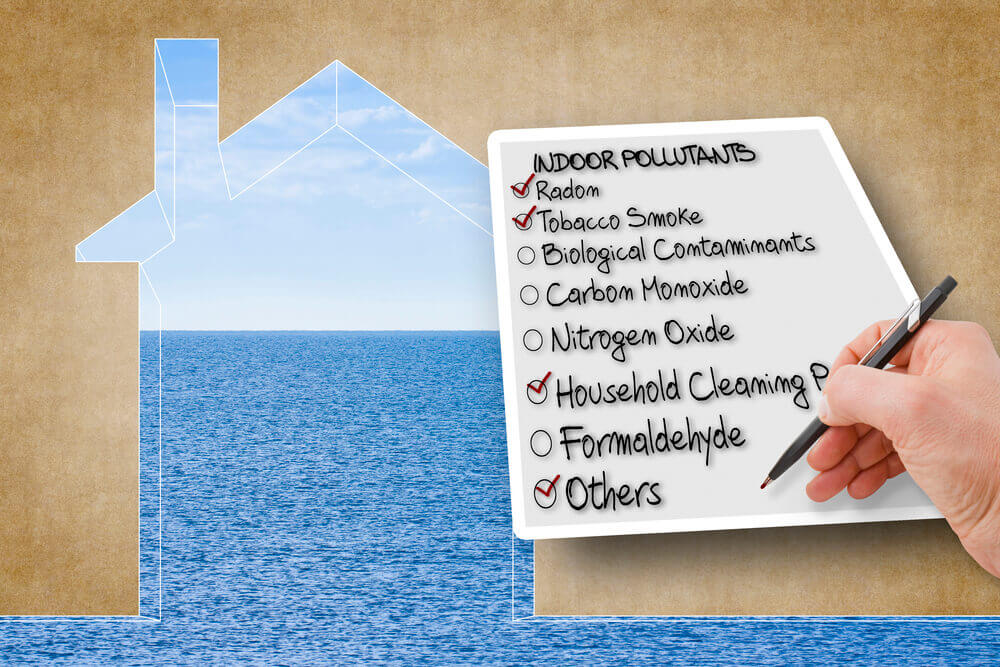Every now and then, we get customers wondering just how much the state of their chimney impacts the air quality of their home. I mean, does it really matter that much? Easy answer – without a doubt! You actually shouldn’t be able to smell your fireplace or stove at all inside of your home, and if you can, then it’s time to call in an expert to look things over and perform cleanings and repairs, as necessary.
Why is this such an urgent thing to address? Well, breathing in the harmful toxins associated with your chimney (think smoke, gases, creosote, etc.) can lead to some serious medical issues, including cancer, respiratory issues, histoplasmosis, and more. This is especially true for those with conditions like asthma, severe allergies, or preexisting conditions.

Needless to say, when it comes to your air quality, there’s no reason to take any chances! If you’re concerned at all about the state of your fireplace or chimney, schedule an inspection with our team. We’ll ensure your structure is in good shape, provide repairs as necessary, and leave you with the peace of mind you deserve moving forward.
It’s Physics!
So, how does the air from your chimney get pushed into your home in the first place? Well, it’s basic physics. When it is hot outside, but your home is filled with the cool air provided by your air conditioner, the pressure from the warmer side will push the heat down your chimney and cause it to fill your home.
Is it humid outside? That will cause condensation to form, which also results in a less than pleasant campfire smell, and it can also cause a lot of damage to your structure. In fact, did you know that just one brick can hold up to 1 ½ cups of water? Now, consider that there are 16 cups in one gallon of water, and that one gallon of water weighs over 8 pounds – that’s a lot of extra weight on your structure (and a lot of potential for a smelly living space)!
All in all, water and masonry never mixes well, so avoiding this scenario at all costs will save you a lot of time, money, and stress down the line. You deserve to have the best aesthetic possible, so let us help you get there. Clean Sweep of Anne Arundel County is ready to assist you soon!
Other Cons Of Poor Air Flow
Now, it’s clear that poor air flow in your chimney can lead to bad odors, exposure to harmful fumes, and even masonry damage, but unfortunately that’s just the beginning. If your structure isn’t well-maintained and tightly capped, then you can bet your cooling system is going to have to work extra hard to combat the warm air that’s entering your home. This results in higher monthly bills, and it could cause your air conditioner to break down prematurely.
In the end, you’re looking at a lot of extra costs that could be avoided, and you may find yourself without A/C during the hottest point of summer. Why not avoid the extra stress and hassle by investing in care from our team now? Just a quick phone call to set up your appointment, and the rest is up to us. Reach out today.
Is There An Ideal Fuel Type When It Comes To Air Flow?
Another question we get from time to time is whether or not one’s fuel type will affect air flow. Well, we have an easy answer for you – nope! All fuel types work the same when it comes to air quality. The biggest factor that will affect whether you have leaks or backflow is whether or not you invest in annual inspections. These give qualified experts the chance to check everything over and determine whether or not your system needs further care.
Any Type Of Odor Could Affect Air Quality!
Most of the time, odors are caused by the smoky smells and creosote that fill your flue. When it mixes with moisture in the chimney that odor can intensify. Yet, there are other times when poor air quality is caused by other factors, such as animal entry, nesting materials, or droppings from birds, raccoons, squirrels and the like. Needless to say, if there is some type of critter in your system or if they left anything in your chimney that doesn’t belong, the sooner everything is out the better!
Animals can also have babies in your chimney, as well as leave behind ticks, fleas, and other insects. And their droppings draw pests in, as well! Your best option for ensuring they stay out for good is having a chimney cap installed. These devices are a must when it comes to maintaining good chimney health, and they prevent rain, leaves, tree branches and all kinds of other debris from entering your system, as well.
Don’t Wait – Book A Time With Us Today
If you’re stressed about the health of your chimney, resolving any worries is simple enough. Just reach out to our team and let us take it from there! As long as your system is cleaned out, in good repair, and being used appropriately, there is no reason you should be experiencing bad odors and issues with air quality. We’re eager to help you out, so give us a call or contact us through our site – we’re here for you every step of the way!
